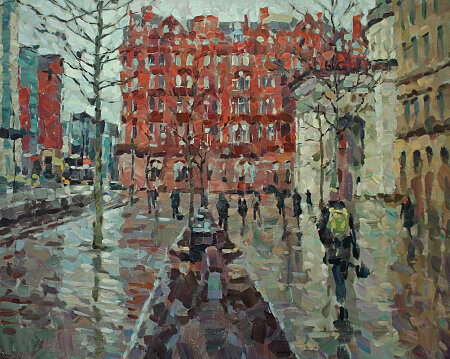
Ann Northcott and the Russian Palace
We walked a little further down the hall, came to a painting of a small palace, bluish-gray against a smudgy white sky, an empty public square before it.
Ann was making funny squirting noises with her lips, a sure sign of boredom. I suspected she was on something besides vodka.
Are you high? I asked.
Always. As high as possible. How can you stand to write? I really hate it when we have writing homework.
So you’ve said. I just take dictation.
What?
I hear voices and write down what they say.
Sounds fake. ‘Dictation.’ Imagine a guy named Dick Tation.
He would tell you what to do, I said.
I need someone to tell me what to do.
You think so?
Yeah. So I can do the opposite.
The painting drew my attention again. I studied the palace, its wide edifice brooding in its blues and grays, its arched carriageway and dim gold domes, a few desperate, bare trees off to one side, a place that seemed doomed yet defiant with some secret, hidden splendor, all hunkered before the dangerous square. A Russian palace. I felt an unaccountable ferment, and as I was trying to understand it we heard thunder far above us.
Thundersnow. It’s a portent, I said as it sounded again, a dark sound from unknown heights in stupendous columns of snow.
I want such portents to last, I said. I want to live in portents.
Did you say poor tents?
Portents.
Importance? Or did you say Hortense? Nobody is named Hortense anymore.
Quit screwing around. Man, for someone who hates language you sure like to play with words. That sounded like Alice in Wonderland, what you said.
Ann clapped with glee and hopped.
My favorite book! About the only thing I like to read.
What drew me to Ann Northcott? Her beauty, sure, but it was a beauty that disregarded itself, didn’t take itself seriously, rejected shallow attention. Her manner alternated between bleakness and mischief. I wondered which had the upper hand. They seemed to take turns, neither acknowledging the other. As I think now, it was these maddening contradictory moods that provoked my wanting to know her.
I noticed in the hall a door with an old-fashioned white porcelain knob. I turned it, rattled it. It was loose but did not turn. A moment later to my shock the door wrenched open to reveal an older man in a blue silk bathrobe. An older woman lay in bed behind him, covers pulled up to her nose.
What are you doing? he asked. He had an accent.
I—I was just trying the door to see what was in there—I didn’t think anybody—
You were hoping to have a nice time with her in here, I can tell.
No, really—
With him? Ann said. Eww. Not in a million years.
Thanks for backing me up, I said.
The man saw Ann looking at the palace painting.
That’s the palace where my wife was born, he said, naming some Russian city I didn’t recognize.
Is the palace still there? Ann asked. It seemed a serious question. The man turned to his wife, who, in a surprisingly youthful voice, answered:
It will always be there.
The man turned back to me.
Well, go on back down and leave us alone up here.
Ann and I picked up our glasses and went down.
Was that, like, Carole’s grandfather? Ann asked.
I shrugged. I was chapped at her.
Who cares? I said. Her father, I think. Not sure. Older than you’d expect, if so.
Like, way older.
Am I really that revolting to you?
I was just trying to help get us out of the situation.
It wasn’t that much of a situation. Of very little importance, Hortense.
